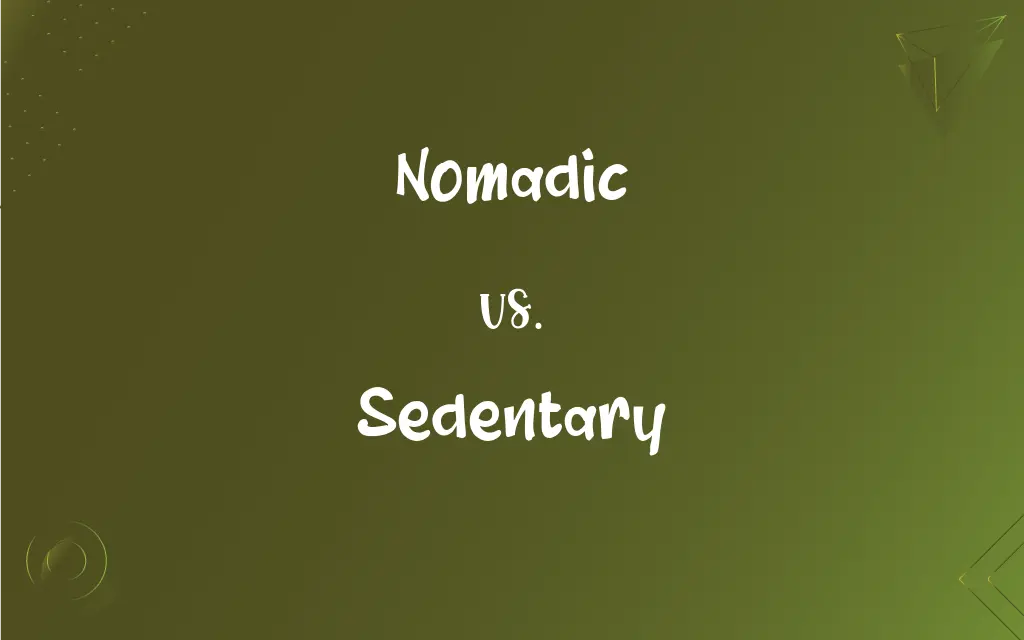Nomadic vs. Sedentary: What's the Difference?
Edited by Harlon Moss || By Janet White || Updated on November 15, 2023
Nomadic refers to a lifestyle of constant movement without a fixed home, while sedentary pertains to a settled, non-moving lifestyle.

Key Differences
Nomadic lifestyles are characterized by consistent movement from one place to another, driven by factors such as the search for food, water, or suitable climate. In contrast, sedentary lifestyles involve remaining in one location, typically with established communities and fixed dwellings.
Historically, nomadic groups have often been pastoralists, moving their herds with the changing seasons. This is in stark contrast to sedentary populations, which usually rely on agriculture, having permanent farms and fields that require them to stay in one location.
The nomadic way of life often necessitates adaptability and minimalistic living due to the transient nature of their existence. Conversely, sedentary societies can accumulate possessions, establish infrastructure, and develop complex societal structures, given their stability.
Nomadic communities typically have a deep knowledge of vast terrains, understanding the nuances of changing landscapes. This is different from sedentary populations, which possess a profound understanding of their local environment and its resources.
While the nomadic lifestyle offers freedom and can lead to a deep bond with nature, it can also pose challenges in accessing modern amenities and services. In contrast, sedentary lifestyles often benefit from advancements in technology, education, and healthcare due to their static nature.
ADVERTISEMENT
Comparison Chart
Lifestyle
Constant movement
Fixed, stable living
Historical Occupation
Often pastoralists
Agriculturists
Living Conditions
Minimalistic, adaptable
Accumulation, infrastructure
Knowledge
Broad terrains
Local environment
Modern Amenities
Limited access
Better access
ADVERTISEMENT
Nomadic and Sedentary Definitions
Nomadic
Pertaining to constant movement without a permanent home.
The tribe led a nomadic life, moving with the seasons.
Sedentary
Relating to a lifestyle with little to no physical movement.
Sedentary jobs often lead to health issues.
Nomadic
Characterized by wandering from place to place.
Nomadic artists travel, seeking inspiration from various cultures.
Sedentary
Fixed in one place; stationary.
Sedentary tribes established permanent villages.
Nomadic
Living a life without fixed settlements.
The desert people have a nomadic lifestyle due to scarce resources.
Sedentary
Pertaining to those who are not nomadic.
Sedentary civilizations often build grand monuments.
Nomadic
Relating to populations that move frequently.
Nomadic cultures have a rich tradition of oral storytelling.
Sedentary
Involving much sitting and little physical exercise.
Watching TV for hours is a sedentary activity.
Nomadic
Not tied to one place; itinerant.
Nomadic workers take jobs wherever they find them.
Sedentary
Characterized by remaining in one location.
Sedentary farmers cultivated the land year after year.
Nomadic
A member of a group of people who have no fixed home and move according to the seasons from place to place in search of food, water, and grazing land.
Sedentary
Characterized by or requiring much sitting
A sedentary job.
Nomadic
A person with no fixed residence who roams about; a wanderer.
Sedentary
Accustomed to sitting or to taking little exercise.
Nomadic
Of or relating to nomads.
Sedentary
Remaining or living in one area; not migratory
Sedentary caribou herds.
Nomadic
(anthropology) Of or related to itinerant herdsmen.
Sedentary
Attached or rooted; sessile
Sedentary marine organisms.
Nomadic
(figuratively) Of or related to any habitually wandering person or animal.
Sedentary
Not moving; relatively still; staying in the vicinity.
The oyster is a sedentary mollusk; the barnacles are sedentary crustaceans.
Nomadic
Of or pertaining to nomads, or their way of life; wandering; moving from place to place for subsistence; as, a nomadic tribe.
Sedentary
Living in a fixed geographical location; the opposite of nomadic.
Nomadic
(of groups of people) tending to travel and change settlements frequently;
A restless mobile society
The nomadic habits of the Bedouins
Believed the profession of a peregrine typist would have a happy future
Wandering tribes
Sedentary
Not moving much; sitting around.
Sedentary
(obsolete) inactive; motionless; sluggish; tranquil
Sedentary
(obsolete) Caused by long sitting.
Sedentary
A sedentary person
Sedentary
Accustomed to sit much or long; as, a sedentary man.
Sedentary
Characterized by, or requiring, much sitting; as, a sedentary employment; a sedentary life.
Any education that confined itself to sedentary pursuits was essentially imperfect.
Sedentary
Inactive; motionless; sluggish; hence, calm; tranquil.
The soul, considered abstractly from its passions, is of a remiss, sedentary nature.
Sedentary
Caused by long sitting.
Sedentary
Remaining in one place, especially when firmly attached to some object; as, the oyster is a sedentary mollusk; the barnacles are sedentary crustaceans.
Sedentary
Used of persons or actions;
Forced by illness to lead a sedentary life
FAQs
Did early humans lead nomadic or sedentary lives?
Early humans were primarily nomadic, becoming sedentary with the advent of agriculture.
Can a society be both nomadic and sedentary?
Historically, some societies have had both nomadic and sedentary components, like nomadic herders and settled farmers.
Can technology foster a nomadic lifestyle today?
Definitely, many use technology to work remotely, allowing a more nomadic existence.
How do nomadic groups maintain their culture?
Often through oral traditions, rituals, and portable art forms.
How do nomads handle healthcare?
Traditional medicine, community knowledge, and adaptability play a role.
Are digital nomads truly nomadic?
While they move frequently, they differ from historical nomads in reliance on technology.
Are there health concerns related to sedentary lifestyles?
Yes, prolonged sedentary behavior can lead to health issues like obesity and heart diseases.
Is urbanization a product of sedentary behavior?
Largely, yes. Urban areas usually arise from settled, sedentary populations.
How do sedentary societies defend their territories?
Often with established armies, walls, and fortifications given their permanent nature.
What's a primary economic activity for sedentary societies?
Agriculture is a cornerstone for many sedentary groups.
Does the modern world support nomadic lifestyles?
While less common, modern nomads exist, often facilitated by technology and remote work.
Are sedentary societies more likely to have written records?
Typically, yes, as their stable nature often fosters record-keeping and literacy.
How do nomadic groups view land ownership?
Many have communal views on land, with less emphasis on individual ownership.
How do nomads interact with neighboring groups?
Interactions can vary from trade to conflict, depending on various factors.
Can nomadic societies have complex societal structures?
Yes, while they may be mobile, many have rich traditions and complex societal roles.
How do nomads handle education?
Through community teachings, hands-on experiences, and oral traditions.
Are sedentary populations larger than nomadic ones?
Typically, sedentary areas can support larger populations due to stable food sources.
Is the shift from nomadic to sedentary irreversible?
Not necessarily. Factors like climate or socio-economic changes can cause shifts.
Do sedentary lifestyles require more resources?
Often, yes, due to infrastructure, housing, and other permanent establishments.
Can sedentary lifestyles lead to greater innovation?
Stability can foster innovation, but both lifestyles have their unique innovations.
About Author
Written by
Janet WhiteJanet White has been an esteemed writer and blogger for Difference Wiki. Holding a Master's degree in Science and Medical Journalism from the prestigious Boston University, she has consistently demonstrated her expertise and passion for her field. When she's not immersed in her work, Janet relishes her time exercising, delving into a good book, and cherishing moments with friends and family.
Edited by
Harlon MossHarlon is a seasoned quality moderator and accomplished content writer for Difference Wiki. An alumnus of the prestigious University of California, he earned his degree in Computer Science. Leveraging his academic background, Harlon brings a meticulous and informed perspective to his work, ensuring content accuracy and excellence.






































































